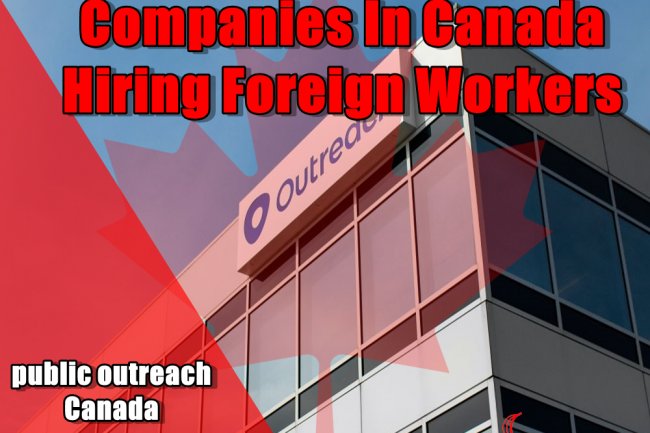Find Jobs in Canada Without Work Permit Requirements - Apply Now
Most foreign nationals wishing to work in Canada require a work permit, which is a legal document authorizing a foreign national to engage in employment and receive compensation from a Canadian employer. Meanwhile, in some unique circumstances, a foreign national may work in Canada without a work permit

Most foreign nationals wishing to work in Canada usually need a work permit, which is a legal document authorizing a foreign national to engage in employment and receive compensation from a Canadian employer. But in some cases, a foreign national may work without a permit. However, there are jobs in Canada without work permit requirements and several other instances where a visa holder does not require having a Canadian work permit.
If you wish to live and work in Canada, then this post will go a long way in providing you with answers to various questions that bother you about working in Canada. When it comes to immigrating to a foreign country, there are a few things that need to be put in place before getting there, or after getting there.
However, if thinking of permanently moving to another country and you need a means of survival, getting a job becomes necessary. Now, depending on how things work in that particular country, work permits may be needed before you are permitted to work in the country. While this kinda sounds displeasing, getting a work permit in Canada isn’t difficult.
While some jobs in Canada do require a work permit, there are also jobs in Canada without work permit requirements. In this article, we will be providing a list of these careers that you can engage in without getting a work permit. Now, just before we go into listing these jobs that do not require a work permit. It's best to arm your preparation with a full understanding of the concept of a Canadian work permit.
What is a Canadian Work Permit?
A work permit in its simplest term is permission to take a job within a foreign country. Depending on the situation, work permits can be necessary for minors who aim to work. These permits will allow minors to legally work under child labor laws.
However, judging by the explanation given above, it’s okay to say that work permits in needed in Canada for you to be able to work in Canada. That is to say, for any foreigner to work in Canada he/she needs a piece of document that permits such an individual; this is simply the basis of a work permit in the country. Moreover, in Canada, there are two categories of work permits for every foreign national. On each of the permits, there's a list of employers one can work with.
Furthermore, foreigners who want to immigrate to Canada for employment purposes will need to have received a job offer in the country in order to be eligible to apply for a Canadian work permit. But there are other pathways you can follow to enter Canada without being offered a job offer in Canada.
Immigrating to Canada Without a Job Offer
When immigrating to Canada as skilled workers, immigration experts usually encourage those entering the Express Entry Pool to obtain a job offer before settling in Canada for extra CRS Score points. But for those who rather wait until settling in Canada for a job offer, you may want to know your options.
Applying for the Express Entry Programs is the best option for those seeking to immigrate to Canada without obtaining a job offer. The Express Entry Program is an online point-based system that is used to manage applications for permanent residence from skilled workers who can fill jobs where there is a lack of available skilled Canadian workers. However, there are programs within the Express Entry pool that let foreigners immigrate to Canada without a job offer. They are as follows:
- Federal Skilled Worker Program (FWSP)
- Federal Skilled Trades Program (FSTC)
- Canadian Experience Class (CEC)
Federal Skilled Worker Program (FSWP)
The Federal Skilled Worker Program is one out of three pathways within Express Entry that allow one to work in Canada. The FSWP was the world’s first program to evaluate immigration candidates objectively. Canada launched the Federal Skilled Worker Program (FSWP) in 1967 to select immigrants from all over the world. The FSWP is specific for those who are skilled workers with extensive education and work experience.
Federal Skilled Trades Program (FSTC)
Immigration, Refugees and Citizenship Canada (IRCC) launched the Federal Skilled Trades Program (FSTP) in 2013 to offer a dedicated immigration pathway to skilled trades workers. The Federal Skilled Trades Program is for skilled workers who want to become permanent residents based on being qualified in a skilled trade.
The FSTP is one of three federal economic programs managed by the Government of Canada’s Express Entry system. Express Entry is the main way Canada welcomes economically class skilled workers to immigrate to the country. Applying through the FSTP is one of many ways you can pursue immigration to Canada as a skilled trades professional.
Canadian Experience Class (CEC)
Immigration, Refugees and Citizenship Canada (IRCC) launched the Canadian Experience Class (CEC) program in 2008 to offer a dedicated skilled worker pathway to temporary foreign workers and international graduates who want to obtain permanent residence status. The Canadian Experience Class allows those who have worked or studied in Canada to become Permanent Residents.
The CEC has since grown into one of Canada’s largest immigration pathways for skilled workers and is regarded as an overwhelming success by governments across Canada, communities, employers, and immigration candidates themselves.
In short, the CEC is a prominent option for temporary foreign workers and international graduates who go on to gain Canadian work experience. The CEC is among the three programs under Canada’s Express Entry system.
Other Related Posts :
The Top 7 Easiest Ways to Immigrate to Canada
10 Best Cities to Settle in Canada
Top Employable Degrees in Canada in 2022
Canada to Welcome Over One Million Immigrants in 2022
Canadian Cities Suitable for Arab
Cheapest Universities in Canada For International
Jobs in Canada Without Work Permit Requirements
However, foreign nationals may seek employment in Canada without a work permit if they work in one of the following jobs categories:
- athlete or coach
- aviation accident or incident investigator
- business visitor
- civil aviation inspector
- convention organizer
- crew member
- emergency service provider
- examiner and evaluator
- expert witness or investigator
- a family member of a foreign representative
- foreign government officer or representative
- health care student
- judge, referee, or similar official
- military personnel
- news reporter or film and media crew
- producer or staff member working on advertisements
- performing artist
- public speaker
- religious leader
- short-term highly-skilled worker
- short-term researcher
- student working off-campus
- student working on-campus
Athlete or Coach
You may be exempt from requiring a work permit if you are a foreign national who is a member of a foreign athletic team who is competing in Canada. The provision includes a foreign athlete, coach, or member of a foreign team competing in Canada.
Business Visitor
Business Visitors are foreign nationals who travel to Canada to undertake business activities but do not enter the Canadian labor market. If you meet the definition of a business visitor, you may be exempt from requiring a Canadian work permit.
Health Care Student
If you are a foreign national who is studying in a healthcare field in Canada and wishes to undertake employment as part of a training program, you may be eligible for a work permit exemption. In order to qualify for the exemption, you must meet the four following conditions:
- You must be participating in clinical clerkships.
- The main goal of your employment is for training purposes.
- You must have written approval from the provincial regulatory body which regulates your profession (please note that not all provinces require this).
- Your training must last less than 4 months.
Military Personnel
If you are a member of the armed forces of another country you may be eligible for a work permit exemption in Canada. To qualify for this exemption, you must have movement orders stating that you are entering Canada under the Visiting Forces Act.
Religious Leader/ Clergy
If you are a foreign national who is an ordained minister, a layperson, or a member of a religious order. You may qualify for a work permit exemption to undertake religious work in Canada. Your duties in Canada may include the following: preaching doctrine, leading worship, and/or giving spiritual counseling.
Public Speaker
If you are a foreign national who is a guest speaker, a commercial speaker, or a seminar leader you may qualify for a work permit exemption. Only speakers at events lasting no longer than 5 days are eligible for this exemption.
Student working off-campus
Full-time international students do not require a work permit to work off-campus during their studies. Full-time international students are eligible to work up to 20 hours per week during study periods and to work full-time during regularly scheduled academic holidays and breaks.
Student working on-campus
If you are a full-time international student in Canada. You do not require a work permit to work on-campus where you study. Full-time international students are eligible to work up to 20 hours per week during study periods and to work full-time during regularly scheduled academic holidays and breaks.
How to Get a Canadian Work Permit
However, there's a little or more complex process to everything about jobs and having a career in Canada. If you are relocating to another country. You may be met with similar requirements with possibly a different name and a slightly different application.
As a professional and just a graduate coming to Canada as a temporary foreign worker, you must get a work permit. Moreover, before you can apply for the permit you must get a job offer from a Canadian employer. On the other hand, the employer must apply for a Labour Market Impact Assessment (LMIA) from Employment and Social Development Canada (ESDC).
Final Thought
If the job you intend to take on, isn’t on the list above, then you will require a work permit. If however, you are a student on scholarship and intend to run some side business in school. You definitely won’t be needing a work permit.
Moreover, there are other instances where a visa holder does not require having a Canadian work permit. Such as traveling to Canada for business for a short stay. Or studying in Canada also does not require a working visa.
There are also various pathways available to foreigners seeking to immigrate to Canada permanently. Which won't require having to apply for a Canadian work permit. Which may be a better option depending on individual circumstances.
What's Your Reaction?




















